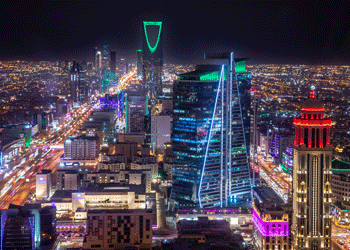Saudi lenders gear up for corporate growth
13 March 2024
 MEED's April 2024 special report on Saudi Arabia includes:
MEED's April 2024 special report on Saudi Arabia includes:
> GVT & ECONOMY: Saudi Arabia seeks diversification amid regional tensions
> UPSTREAM: Aramco spending drawdown to jolt oil projects
> DOWNSTREAM: Master Gas System spending stimulates Saudi downstream sector
> POWER: Riyadh to sustain power spending
> WATER: Growth inevitable for the Saudi water sector
> CONSTRUCTION: Saudi gigaprojects propel construction sector
> TRANSPORT: Saudi Arabia’s transport sector offers prospects

As Saudi Arabia’s once rapacious mortgage market slows down, lenders in the kingdom are building up their corporate loan books.
Banks’ exposure to the retail market is steadily reducing as the growth of the mortgage market – the big driver of credit growth in recent years – abates. Saudi lenders reported mortgage lending growth of 8% in the first nine months of 2023, compared to 19% in September 2022.
And where once the split between new business booked by Saudi banks was weighted 60:40 on retail and corporate, the split in 2023 was 50:50.
“We have noticed a decrease in Casa (current account and savings accounts). It used to be almost 70% a couple of years ago, but now it is close to 50%, and it means that the cost of funding is growing too,” says Anton Lopatin, senior director, financial institutions at Fitch Ratings.
Changing landscape
One component of this is the moderation of mortgage financing on the back of tightening subsidies and higher interest rates. “In general, the affordability of mortgage financing is less now and we see banks switching their focus to corporate lending. There’s a bit of reshuffling going on and we think that about 60% of the financing growth in 2024 will be from the corporate sector,” says Lopatin.
While Saudi Arabia's Vison 2030 projects have yet make little impact on local banks’ loan books, the expectation is that this will change, and that major economic diversification initiatives will yield good business for Saudi banks.
In the meantime, these lenders must deal with some near-term challenges in 2024, notably higher liquidity – a contrast to the situation in 2022, when financing growth of 14% outpaced deposit growth at 9%, and higher interest rates intensified competition for funding, according to Fitch Ratings. Data from the Saudi Arabian Monetary Agency (Sama) shows that the kingdom’s money supply surged 10% in January 2024 to reach SR2.72tn ($726bn).
That growth was primarily driven by a significant rise in banks’ term and savings accounts, which recorded a rise of 31% to reach SR864.32bn ($230.4bn). These deposits have attracted savings looking for higher yields.
Government reallocation
Another trend has been that government-related entities (GREs) have made moves to increase deposits in the banking system. According to Fitch, liquidity has been supported by increased deposit inflows from GREs, which grew by SAR147bn ($39.2) or 23% in the 12 months to the end of October 2023. Another ratings agency, S&P, noted that the contribution of government and GRE deposits increased to 30% of the total by 2023 from almost 20% in 2020.
According to Fitch, these inflows are mainly term deposits, which are an expensive source of funding for banks. This increase, plus higher competition for funding, has significantly raised the average cost of funding for Saudi banks; it rose to 2.7% in the first nine months of 2023, compared to just 0.4% in 2021.
“There’s been a change in how the Saudi authorities are managing GRE liquidity,” says Lopatin, who notes that GREs are now choosing to invest their surplus liquidity in higher income-generating deposits with commercial banks, rather than with Sama.
“Since July last year, we’ve seen a significant increase in government-related deposits in the banking sector. And we understand they have adjusted this approach, and now the government entities directly deposit with banks, instead of using the central bank as an additional chain into distribution of liquidity. That is also more efficient.”
Challenging conditions
Banking conditions in Saudi Arabia are looking more challenging in 2024 than in previous years. As Fitch notes, Saudi banks on average saw financing growth slightly above 10% for 2023, and the expectation is that growth will also be about 10% in 2024 – below the expansion of 14% seen in 2022.
Some banks that used to have stronger net margins have reported declines because of the focus on mortgage financing –which is under fixed rates in the kingdom – in conjunction with an increased cost of funding on the back of a declining proportion of Casa accounts. For example, Al Rajhi Banking & Investment Corporation reported that funding costs increased by 74% in year-on-year terms in 2023.
“Al Rajhi’s margins were under pressure last year but are now roughly in line with the sector average of 3.2%,” says Lopatin.
In general, UAE banks reported stronger margins than Saudi banks in 2023, says Lopatin. This is because, in combination with tightening liquidity, Saudi lenders have less ability to manage their margins.
Corporate lending in the kingdom will likely receive a boost from Vision 2030 projects.
“We expect more Vision 2030-related financing to appear on banks’ books this year. It’s still not very material, but most banks want to participate as they see these projects as having a decent balance between risk and reward,” says Lopatin.
Rating agency S&P has said that Saudi banks will need stronger access to international capital to sustain growth and continue financing projects related to Vision 2030. For now, the dependence of Saudi banks on external funding is limited.
Over the long-term, if Saudi banks do build more external debt, that could pose another challenge. International investors now have sustainability at the centre of their investment mandates, and local lenders will also need to look more seriously at their own sustainability metrics.
For example, last year, a panel of UN-appointed human rights specialists was reported to have sent letters to Saudi Aramco and financiers including Citi, Goldman Sachs and BNP Paribas, noting that their financing of the state energy company may be in violation of global human rights rules due to the company’s contribution to climate change. The letter urged the banks to take reasonable steps to prevent or mitigate the impact.
If Saudi banks do become major lenders to Vision 2030 schemes, and therefore need to source funds from outside the kingdom, they too will have to acclimatise to the new global reality – even if that is not a pressing requirement right now.
Exclusive from Meed
-
 Saudi Arabia appoints new investment minister
Saudi Arabia appoints new investment minister13 February 2026
-
 Indian firm wins major Oman substation contract
Indian firm wins major Oman substation contract12 February 2026
-
 Dewa raises Empower stake in $1.41bn deal
Dewa raises Empower stake in $1.41bn deal12 February 2026
-
 Saudi cabinet approves Qatar high-speed rail link
Saudi cabinet approves Qatar high-speed rail link12 February 2026
-
 Bidders line up for Saudi sewage treatment contract
Bidders line up for Saudi sewage treatment contract12 February 2026
All of this is only 1% of what MEED.com has to offer
Subscribe now and unlock all the 153,671 articles on MEED.com
- All the latest news, data, and market intelligence across MENA at your fingerprints
- First-hand updates and inside information on projects, clients and competitors that matter to you
- 20 years' archive of information, data, and news for you to access at your convenience
- Strategize to succeed and minimise risks with timely analysis of current and future market trends

Related Articles
-
 Saudi Arabia appoints new investment minister
Saudi Arabia appoints new investment minister13 February 2026
Register for MEED’s 14-day trial access
King Salman Bin Abdulaziz Al-Saud has made a series of senior government changes, including Khalid Al-Falih leaving his role as investment minister to become minister of state and a member of the cabinet.
Al-Falih has been replaced by Fahad Al-Saif as investment minister. Al-Saif has been head of the Investment Strategy and Economic Insights Division at the Public Investment Fund (PIF) since 2024. That role involved formulating PIF’s long-term investment strategy. He has also served as head of the Global Capital Finance Division, a role he has held since joining PIF in 2021.
The change of investment minister comes at a time when securing investments has become a key priority for Saudi Arabia as it prepares to hand over more projects to the private sector for delivery.
King Salman also named Abdullah Al-Maghlouth as vice-minister of media and Abdulmohsen Al-Mazyad as vice-minister of tourism. Khalid Al-Yousef was named attorney general, and Sheikh Ali Al-Ahaideb will serve as president of the Board of Grievances.
Faihan Al-Sahli was selected as director general of the General Directorate of Investigation, while Abdulaziz Al-Arifi was chosen to lead the National Development Fund. Haytham Al-Ohali will head the Communications, Space and Technology Commission, and Fawaz Al-Sahli will chair the Transport General Authority.
https://image.digitalinsightresearch.in/uploads/NewsArticle/15645415/main.gif -
 Indian firm wins major Oman substation contract
Indian firm wins major Oman substation contract12 February 2026

India’s Larsen & Toubro has won a contract to build the Majan 400/220/132kV grid station in Oman.
Estimated to cost $100m, the project includes an associated 400kV line-in line-out underground cable from Sohar Free Zone to the Sohar Interconnector Station.
The contract was awarded by Oman Electricity Transmission Company (OETC), part of the government-owned Nama Group.
The grid station will comprise eight 400kV gas-insulated switchgear (GIS) bays, eight 220kV GIS bays and 10 132kV GIS bays at the new Sohar Free Zone substation.
The scope includes the installation of two 500MVA, 400/220kV transformers and two 500MVA, 220/132kV transformers.
Local firm Monenco Consulting Engineers was appointed in April last year to provide design and supervision services for the project.
As MEED exclusively revealed, the main contract was tendered in June, as part of three significant contracts to build new substations in the sultanate.
The second contract, worth about $35m, covers the construction of the Sultan Haitham City 132/33kV grid station and associated 132kV line-in line-out underground cables running 4 kilometres from Mabella to Mabella Industrial Zone.
The third contract, valued at about $100m, covers the construction of the Surab 400/33kV grid station and an associated 400kV line-in line-out cable from the Duqm grid station to the Mahout grid station.
Local firms Muscat Engineering Consulting and Hamed Engineering Services are consultants for the Sultan Haitham City and Surab projects, respectively.
The two remaining contracts are currently under bid evaluation, with awards expected this quarter.
https://image.digitalinsightresearch.in/uploads/NewsArticle/15638107/main.jpg -
 Dewa raises Empower stake in $1.41bn deal
Dewa raises Empower stake in $1.41bn deal12 February 2026
Dubai Electricity & Water Authority (Dewa) has announced it has increased its stake in Emirates Central Cooling Systems Corporation (Empower) from 56% to 80%.
The transaction was completed through the purchase of 2.4 billion shares and the transfer of the entire ownership of Emirates Power Investment (EPI), which is wholly owned by Dubai Holding.
The total value of the deal is AED5.184bn ($1.41bn).
Empower currently holds over 80% of Dubai’s district cooling market and operates 88 district cooling plants across the emirate.
According to MEED Projects, the UAE’s district cooling sector currently has nine projects worth $1.29bn in the pre-execution phase.
Empower has ownership in four of these projects, which have a combined value of $472m.
This includes a $200 million district cooling plant at Dubai Science Park, with a total capacity of 47,000 refrigeration tonnes serving 80 buildings.
Empower signed a contract to design the plant last August, with construction scheduled to begin by the end of the first quarter of 2026.
The utility is also building a district cooling plant at Dubai Internet City.
UAE-based TMF Euro Foundations was recently appointed as the enabling and piling subcontractor for the project.
https://image.digitalinsightresearch.in/uploads/NewsArticle/15635949/main.jpg -
 Saudi cabinet approves Qatar high-speed rail link
Saudi cabinet approves Qatar high-speed rail link12 February 2026
Saudi Arabia has approved the establishment of a proposed high-speed rail line connecting Riyadh and Doha.
The approval was granted during a cabinet session chaired by King Salman Bin Abdulaziz Al-Saud in Riyadh on 10 February.
The high-speed railway line will cover 785 kilometres (km) and will pass through Hofuf and Dammam, while also linking King Salman International airport and Hamad International airport.
Saudi Arabia and Qatar signed an agreement in December last year to build a high-speed rail line.
The agreement was inked by Saudi Arabia’s Transport & Logistics Services Minister, Saleh Al-Jasser, and Qatar’s Transport Minister, Sheikh Mohammed Bin Abdulla Bin Mohammed Al-Thani.
Trains will reach speeds exceeding 300 kilometres an hour, reducing the travel time between the two capitals to about two hours.
The project is slated for completion in six years. It is expected to serve over 10 million passengers annually and create more than 30,000 direct and indirect jobs.
Riyadh and Doha relaunched the proposed rail link between the two countries in 2022, after agreeing to set a date to begin studying the connection.
In July of that year, France’s Systra was selected to conduct a feasibility study on the proposed scheme, as MEED reported.
A rail link connecting Saudi Arabia and Qatar was planned before the diplomatic dispute that froze relations between Riyadh and Doha from 2017 until the Al-Ula Declaration was signed in January 2021.
In 2016, Qatar Railways Company (Qatar Rail) planned to tender a design-and-build contract for the construction of regional railways in Qatar, including a link to the Saudi border.
https://image.digitalinsightresearch.in/uploads/NewsArticle/15635582/main.jpg -
 Bidders line up for Saudi sewage treatment contract
Bidders line up for Saudi sewage treatment contract12 February 2026

Six bidders are competing in the next phase of Saudi Arabia’s long-term operations and maintenance (LTOM) sewage treatment programme, as National Water Company (NWC) moves closer to awarding a contract.
The contract covers the North Western A Cluster Sewage Treatment Plants Package 11 (LTOM11) and has an estimated value of about $211m.
The project involves the construction and upgrade of two sewage treatment plants with a combined capacity of about 440,000 cubic metres a day (cm/d).
As MEED understands, the companies that have submitted proposals include:
- Alkhorayef Water & Power Technologies (Saudi Arabia)
- Civil Works Company (Saudi Arabia)
- United Water (China)
- Kuzu Group (Turkey)
- VA Tech Wabag (India)
- Aguas de Valencia (Spain)
LTOM11, also known as the North Western A Cluster, forms part of the second phase of NWC’s rehabilitation of sewage treatment plants programme.
The scheme is being procured on an engineering, procurement and construction (EPC) basis with a long-term operations component.
The scope also includes a pumping station, surplus discharge lines, SCADA installation and associated infrastructure.
The main contract was tendered last year, with an award initially expected by the end of 2025.
It is now understood that NWC is preparing to offer the main contract in this quarter.
LTOM programme
LTOM11 follows a series of earlier awards under the programme.
In January, a consortium of United Water (China), Prosus Energy (UAE) and Armada Holding (Saudi Arabia) won the main contract for the Northern Cluster Sewage Treatment Plants Package 10 (LTOM10).
This has an estimated value of about SR203m ($54.1m).
NWC previously awarded $2.7bn-worth of contracts for the first phase of its LTOM programme. This comprises nine packages covering the treatment of 4.6 million cm/d of sewage water for the next 15 years.
As MEED reported, local contracting firm Alkhorayef Water & Power Technologies won three contracts with a combined capacity of 2.04 million cm/d, nearly half of the awarded total. These three contracts are worth more than SR5.53bn ($1.47bn).
A consortium of France’s Suez and the local Al-Awael Modern Contracting Group, with its affiliate Civil Works Company (CWC), won two packages worth a combined SR1.84bn.
A consortium comprising France’s Veolia and Awael-CWC won a single package worth SR1.26bn, and local utility developer Miahona won one package worth SR392m.
In 2024, a joint venture of CWC and Al-Awael Modern Contracting was awarded a $211m contract for LTOM9.
As part of the second phase, the main contract bids for LTOM12 (North Western B Cluster) have also been submitted.
https://image.digitalinsightresearch.in/uploads/NewsArticle/15635292/main.jpg




.gif)